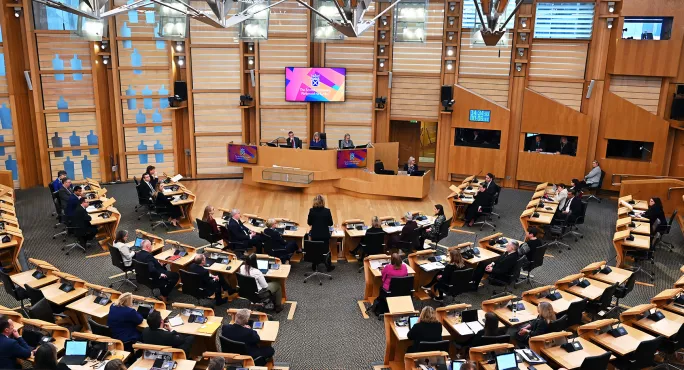UNCRC introduction is ‘historic day’, says commissioner

The incorporation of a key United Nations treaty into Scots law has been hailed as a “historic day” by the country’s children and young people’s commissioner.
Legislation passed by the Scottish Parliament to incorporate the United Nations Convention on the Rights of the Child (UNCRC) came into force today.
The initial bill was blocked by the UK Supreme Court in 2021 over fears it could have an impact on Westminster legislation, but was passed unanimously following a reconsideration stage - the first of its kind - at Holyrood last year.
Protecting children’s rights
The changes will enshrine the treaty - which includes the right to healthcare and education and to live a life free from abuse - into law, but it will also provide for legal remedies should any breaches take place.
The act will allow the commissioner’s office to intervene in legal matters and to bring cases forward when children and young people’s rights are not being respected.
- Children’s rights: The school that puts children’s rights first
- Additional support needs: Mainstream education “intolerable” for children with ASN, find MSPs
- Children’s commissioner: Gilruth responds to criticism
Children’s commissioner Nicola Killean stressed the importance of the law taking effect.
“It is a historic day in Scotland for children,” she told BBC Radio Scotland.
“Incorporation really matters” because it “gives the legal power to challenge where rights are violated” and “makes children’s rights enforceable”, she added.
Children ‘don’t have economic or political power’
Asked why it is important for the law to come into effect when children are already protected from abuse by the law, guaranteed a school place and provided with free healthcare through the NHS, Ms Killean said young people “don’t have economic or political power”.
She said that having their rights enshrined in law will “ensure that children are put first whenever we’re looking at any law, any policy, any practice and considering what that means for children’s rights”.
The emphasis on children’s rights in Scottish schools has increased in recent times with many schools - including Firrhill High in Edinburgh - receiving recognition for their work in this area.
However, in evidence to the Scottish Parliament’s Education, Children and Young People Committee in March, it was made clear that there was room for improvement, especially when it came to children with additional support needs.
Megan Farr, policy officer for the children’s commissioner, told the committee, as it carried out its additional support for learning inquiry, that incorporation would bring with it “legal obligations”.
She said this included the obligation “to deliver an education for children that meets Article 28, which is the right to an education, as well as Article 29, which talks about the development of a child’s personality, talents and mental and physical abilities to their fullest potential””.
“I think that we are not doing that for far too many children at the moment,” she added.
At a meeting of the committee in April, MSPs were also told that, while the commissioner would hope to resolve issues with public bodies outside of court, “a strategic litigation toolkit” had been developed to help decide which cases to take forward following incorporation.
Nick Hobbs, head of advice and investigations at the office of the children’s commissioner, said the cases the commissioner would pursue were “the ones that will have the most impact” - including those that offered “the opportunity to change the law, to establish precedents and to address issues where there are systemic rights breaches that affect large numbers of children or perhaps a smaller group of children in a really fundamental way”.
Legislation ‘is a milestone’
Today children’s minister Natalie Don described the legislation as a “milestone”.
She added: “We want all young people to grow up loved, safe and respected, and the UNCRC Act aims to do just that.
“We all have a responsibility to ensure that children and young people are at the heart of decisions that affect them and that they have the confidence and skills to get involved.”
Ms Don added: “The Scottish government is proud that we are the first devolved UK nation to incorporate the UNCRC into law, helping to make Scotland the best place in the world to grow up.”
Joanna Barrett, associate head of policy for the nations at children’s charity the NSPCC, said it was a “momentous day for babies, children and young people in Scotland”.
She added: “This is a significant milestone in making sure that all children’s rights are recognised, respected and upheld.”
However, it has also been highlighted that children and their families will need support exercising their rights if incorporation is going to be about more than “looking pretty on paper or serving as a flag that we can pull out to say, ‘We have done this’” - as Marie Harrison, of Children in Scotland, put it in her evidence to the Education, Children and Young People Committee in March.
Chloe Minto, a senior solicitor in the Govan Law Centre’s Education Law Unit, expressed similar concerns at that meeting. She said she hoped incorporation would result in “fruitful progress for children” but had “some concerns and reservations about how children will access their rights”.
For the latest Scottish education news, analysis and features delivered directly to your inbox, sign up to Tes magazine’s The Week in Scotland newsletter
You need a Tes subscription to read this article
Subscribe now to read this article and get other subscriber-only content:
- Unlimited access to all Tes magazine content
- Exclusive subscriber-only stories
- Award-winning email newsletters
Already a subscriber? Log in
You need a subscription to read this article
Subscribe now to read this article and get other subscriber-only content, including:
- Unlimited access to all Tes magazine content
- Exclusive subscriber-only stories
- Award-winning email newsletters
topics in this article



